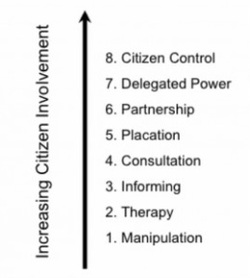Why should landscape be everyone's concern?

... Because beauty lies in the eye of the beholder
Individuals have very different ways of regarding one and the same picture. While some will consider unspoilt nature as the greatest value, others may see the same area through commercial, historical or sentimental lenses. These different views are reflected in different opinions on how this land should be managed. Although the final decisions about the destination of certain plots are made by the local government (with the approval of relevant administrations), by law also local citizens and basically everyone who has an interest in the given area (so called stakeholders) have a right to influence these decisions.
Stakeholder involvement can take many shapes, as seen on the graphic on the right. Most common are:
- Information: a one-way relationship that covers both ‘passive’ access to information on demand and ‘active’ measures by government to disseminate the information
- Consultation: two-way communication in which citizens provide feed-back on governmental policy proposals
- Participation: a multi-channel relationship based on a partnership of citizen and government, in which citizens actively engage in policy-making. Active participation recognises the capacity of citizens to discuss and generate policy options independently – although the responsibility for the final decision rests with the government (2001 OECD Handbook on public participation).
|
|
|
